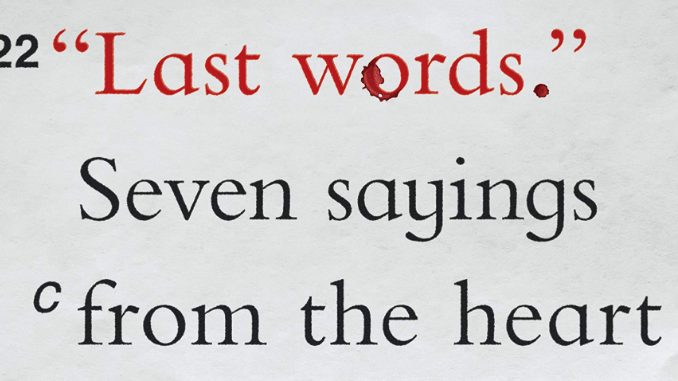
Published by New Growth Press on January 2020
Genres: Non-Fiction, Theology
Buy on Amazon
Goodreads

Christ's final words on earth are full of forgiveness, hope, and compassion. Last Words by Robert J. Nash explores a fresh perspective on the obedience of the cross, revealing the heart of God who sent his son to die. Find new meaning in the power and hope of his death
Last words hold importance in culture throughout human history. They are the dying person’s final impartation to the recipient. One last declaration. One last admonition. One last request. One final articulated thought.
Almost as long as there has been written history, there have been accounts of last words. These words from Jesus are no different, and very early in the church they had been established as part of the Easter liturgy. Some traditions walk through all of these sayings in one service, called a Tenebrae. In this book, John Nash takes a compilation of devotional thoughts from his own church’s Good Friday services to create this short devotional: Last Words.
Nash divides each saying into its own chapter, lasting 7-12 pages. His analysis is fairly standard and basic. He covers each saying well, but doesn’t really say anything new or different or particularly catchy. It’s a catch-22. If you say anything new theologically, it’s probably heresy. But if you just give the standard spiel to a well-known passage of Scripture—well, there’s just nothing new.
Nash’s writing is just…okay. And that’s my two-word review. It’s okay. There’s not much to write about either way. It’s a basic overview of the seven sayings. But nothing about it stands out. And with so many other devotionals and books on this subject, it really needs to be able to set itself apart.
I preached through the Seven Sayings in 2018 and, through that, utilized and studied several different resources that was able to sound distinct and original despite the standard source material. Last Words was not able to do that. It’s theologically sound. It’s average writing. There’s just no hook that makes it stand out in a crowded field.
Read Cross-Shattered Christ by Hauerwas or The Wounded Word by Simon Peter Long. Fleming Rutledge and Erwin Lutzer have great books on this topic as well. I’ll give Nash credit for trying, but his book reads like a standard set of student essays on the subject. He shows mastery of the material, but that doesn’t translate into an engaging book.
